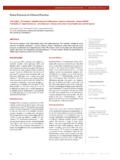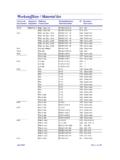Transcription of Gastrointestinal Complications Following Heart …
1 INTRODUCTIONG astrointestinal (GI) Complications occurring after cardiac surgery are considered as second line com-plications due to their scarcity. Cardiac surgeons, ICU staff and nursing personnel are usually aware and suspicious of cardiac-related mishappenings after Heart surgery; however they often tend to underestimate potentially lethal manifestations in-volving the Gastrointestinal track, or organs of the abdomen and subsequent Complications because of their relative infrequency and the fact that they lack a visible connection to the primary target or-gan of the operation. These Complications range from a simple, tempo-rary paralytic ileus, to more grave, highly perilous conditions, such as Gastrointestinal hemorrhage, acalculous cholecystitis, acute pancreatitis, liver fail-ure or mesenteric ischemia (Table 1). A total mortal-ity rate of speaks for itself regarding the gravity of these nosological entities [2-13].
2 Herein, we are performing a thorough review of the up to date literature, focusing on epidemiology, etiology, impact on the postoperative course of car-diac patients as well as modalities of prevention and treatment. 1. Department of Cardiovascular and Thoracic Surgery, University Hospital of Thessaly, Larissa, Greece2. Department of Gastroenterology, University Hospital of Thessaly, Larissa, GreeceCORRESPONDENCEK arangelis Dimos MD, Department of Cardiovascular and Thoracic Surgery, University of Thessaly, Larissa, Greece Tel: 00306944786480 Fax: 00302410530841 E-mail: ISSN 2042-4884 ABSTRACTB ackground and Aims: To focus through a related literature research and the authors personal experience on the issue of Gastrointestinal Complications after Heart surgery.
3 Methods: We included in our review article selected studies dealing with the issue of Gastrointestinal Complications after Heart surgery. Results: All related studies concluded to a relative small incidence for Gastrointestinal complicationsafter Heart surgery of about to [1]. However, the overall mortality was estimated to be disproportionally high, making the impact of these postoperative pathologies a significant one. Conclusions: Gastrointestinal Complications consist a quite rare and often difficult to diagnose category of Complications after Heart surgery, which despite their small incidence, influence the overall mortality rate of cardiac operations. Time-sparing, meticulous performance of the operations and early diagnosis are the best measures against these Complications Following Heart Surgery: An Updated Review CARDIAC SURGERY | REVIEWD imos Karangelis1, Konstantinos Oikonomou2, Theocharis Koufakis1 & Georgios I.
4 Tagarakis1 Received: 1/5/2011, Reviewed 20/5/2011, Accepted 6/6/2011 Key words: Gastrointestinal Complications , cardiac surgery, cardiopulmonary bypassDOI: Intestinal IschemiaThis is a rare but usually devastating complica-tion, which may affect any part of the small or large intestine. It is attributed to hypoperfusion during extracorporeal circulation or periopera-tive haemorrhage, as well as to thromboembolic episodes occasionally influenced by heparin-induced thrombocytopenia. The incidence was estimated to be by Vassiliou et al. [14] in a series of 3,724 retrospectively analysed patients operated in a single centre. A broader study was conducted by Mangi et al. [2] who included 8,709 Heart -operated patients in their analysis. They calculated the overall incidence of gastroin-testinal Complications to be , while intesti-nal ischemia presented in 31 of the patients ( %).
5 Significant (p < ) preoperative predictors of complication were prior cerebrovascular ac-cident (CVA), chronic obstructive pulmonary disease (COPD), type II heparin-induced throm-bocytopenia, atrial fibrillation, prior myocardial infarction, renal insufficiency, hypertension and need for intra-aortic balloon counter-pulsation. Approximately two thirds of the affected pa-tients were surgically treated. Mortality rate for these patients reached 64%, in comparison to 78% for the non-operated patients. The highest mortality rate of 85% due to intestinal ischemia reported Tsiotos et al. [15]. 34 EUROPEAN JOURNAL OF CARDIOVASCULAR MEDICINE VOL I ISSUE III35 EUROPEAN JOURNAL OF CARDIOVASCULAR MEDICINE VOL I ISSUE IIIA nother study that comprised a large number of participants was of Venkateswaran, which identified the incidence of acute mesen-teric ischemia Following cardiopulmonary bypass in 11,202 patients [16].
6 The aforementioned study concluded an incidence of for acute mesenteric ischemia in all patients undergoing cardio-pulmonary bypass (CPB). Predictors of death from GI Complications in general, which also covered intestinal ischemia, included New York Heart Association (NYHA) class III and IV Heart failure, smoking, chronic obstructive pulmonary disease, history of syncope, aspar-tate aminotransferase (AST) >600 U/L, direct bilirubin > mg/dL, pH < , and the need for more than two inotropic agents with vasopressive action. Emmiller et al. [17] added another potential predictor: the applica-tion of extracorporeal circulation. In their retrospective study of 2,625 patients, they compared patients operated with the Heart -lung machine with patients who were operated on beating Heart . The intestinal ischemia incidence was for the first group ver-sus for the latter.
7 Similarly, mortality rate for the first group reached , while the beating Heart group presented no deaths. Additionally, Schuetz et al. [18] exhibited similar incidence rates and 83% mortality for patients affected by intestinal ischemia. Both the above mentioned studies suggested that arteriosclerotic CABG, age >70 years and dehydration as predisposing factors for the de-velopment of intestinal ischemia, and recommended prompt per-formance of angiography and laparotomy as critical interventions that could lower the high mortality rate. Abboud et al, [19] has also mentioned the devastating effects of CPB that produces ischemia/reperfusion syndrome of the intestine. The endpoints of this review were that CPB is incriminated for systemic abnormalities, leading to multi-organ failure and death. On the other hand, Musleh et al, concluded that application of CPB does not seem to provoke higher percentages of GI Complications [20].
8 Gastrointestinal bleedingUpper Gastrointestinal bleeding, particularly in patients with a pre-vious history of gastric or duodenal ulcer, is another significant gas-trointestinal complication after Heart surgery. Contributing factors include preoperative fasting, perioperative coagulation disorders and the systemic inflammatory response which is connected with the application of extracorporeal circulation and, of course, history of gastric or duodenal ulcer. Jayaprakash et al. [21] retrospectively studied 2,274 patients concluding to an incidence for gastrointes-tinal bleeding of and a total mortality rate of 15%, while none of the operated patients deceased. Mean interval between surgery and bleeding approximated 10 days. Houssa et al. [22] investigated a series of 1,278 patients and found an incidence for upper gastro-intestinal bleeding of , a surgical exploration rate of 25% and a mortality rate of cholecystitisAcute cholecystitis includes both calculous as well as acalculous cholecystitis, which occurs more frequently and affects more mor-bid patients.
9 It is attributed both to the systemic hypoperfusion and the systemic inflammatory response which is associated with extracorporeal circulation and is characterised, among others, by coagulation disorders, fluid removal towards the interstitial space, leukocyte count elevation and complement factors activation. Acute cholecystitisAcute cholecystitis includes both calculous as well as acalculous cholecystitis, which occurs more frequently and affects more mor-bid patients. It is attributed both to the systemic hypoperfusion and the systemic inflammatory response which is associated with extracorporeal circulation and is characterised, among others, by coagulation disorders, fluid removal towards the interstitial space, leukocyte count elevation and complement factors activation. Passage et al. [23] performed a retrospective study on 16,576 pa-tients, and found an incidence of for the calculous and a for the acalculous form .
10 The 60% of patients with gallstones and of patients with acalculous cholecystitis had to be operated. Overall mortality rate reached 20% for the calculous and 23% for the acalculous form ; all lethal cases regarded patients submitted to surgery. Yilmaz et al. [24] concluded to a comparable incidence of this complication. They studied 3,158 patients and noted 3 cases of acute cholecystitis. The authors recommend initial conservative treatment with transition to surgery in cases with lack of clinical improvement after 48 pancreatitisThis is another rare but severe complication, having a similar patho-physiological background with acalculous cholecystitis. Hypoper-fusion owed to the application of the Heart -lung machine or due to perioperative bleeding, and the systemic inflammatory response are considered to be the basic causes of triggering acute pancre-atitis.







